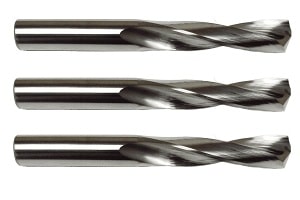Precision is essential in milling processes. This is especially crucial when using a drill bit to drill holes in your workpiece. Drill bits are ordinary tools, but when cutting precision holes in tougher materials, they can cause problems. If you’re having trouble with drill bit precision, stub drills could be the answer.

We’re talking about conventional jobber length twisted drill bits when we say drill bits. These tools are incredibly adaptable, allowing them to drill holes in a wide range of materials. When it comes to milling activities, the biggest issue with drill bits is that they are quite long instruments in comparison to their diameter. This means that at high speeds, they aren’t the most stable alternative.
Drill bits inherently oscillate and vibrate when they spin at high rates. This means that the point of the tip will not always line up with the drill bit’s rotational axis. When drilling into a softer material, such as wood, the bit’s tip may usually find purchase and drill the hole close enough to the intended spot.
When drilling into tougher materials like steel, the problem becomes more serious. When a drill bit collides with a tougher surface, the point may deflect off the surface and miss its target. This can cause damage to both the workpiece and the drill bit, particularly if the drill bit cuts at an angle. Many machinists will utilize a shorter length stub drill to avoid this problem.
The most popular length on the market is jobber length drill bits. Although their considerable length makes them suitable for drilling larger holes, it can also present problems. The capacity of a drill bit to oscillate is proportional to its length when compared to its breadth. The longer a tool is, the more oscillation it will produce. If you don’t need to drill a hole that requires the whole length of your jobber drill, a stub drill’s reduced length can save you a lot of time. Stub drills are significantly more stable and accurate than full-length drill bits because they are shorter.
The construction of your tool, whether you’re using a jobber drill or a stub drill, can have a huge impact on accuracy. Steel is the most prevalent material used in the manufacture of drill bits. Different alloys, such as high speed steel, have different advantages, but these metallic tools are surprisingly versatile. This means that at high speeds, they will fluctuate quite a bit.
Solid carbide tools are one of the greatest ways to produce precise results. Tool carbide is a composite material composed of ceramic tungsten carbide and a binding element such as cobalt. The final product is significantly more stiff than steel. When drilling into tougher materials, carbide drill bits are less likely to wobble and distort. Carbide tools also last longer and can withstand higher temperatures than HSS steel tools, making them an excellent overall choice.
If you’re looking for high-quality carbide tools for your milling machine, www.onlinecarbide.com is a great place to start. Online Carbide makes solid carbide end mills and drill bits and sells them at factory direct prices. Jobber drills, stub drills, and spot drills are among the drill bits available. You can contact their staff by sending an email to sales@onlinecarbide.com if you have any questions about their tools.
For more information about Variable Flute End Mills and Drill Mills For Sale Please visit: Online Carbide.

